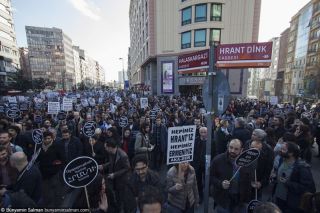By Raffi Wartanian
April 24, 2014 marked the Armenian genocide’s 99th anniversary. Some 1.5 million Armenians perished as the crumbling Ottoman Empire systematically annihilated a target population during WWI. Every year, descendants of the genocide’s survivors scattered throughout Armenia’s global diaspora come together to remember the fallen and demand that the Republic of Turkey recognize what documentation, scholarship, and law have concluded an undeniable act of genocide.
(A version of this article was originally published in The Morningside Post, the student newspaper of the School of International and Public Affairs at Columbia University.)
Today’s Turkish government does not speak of the genocide of the Armenians, and it is a story that remains rarely heard across the globe. Turkey’s citizens and allies are actively discouraged from speaking of the Armenian genocide through a two-pronged, state-sponsored historical revisionism project.
The first prong of the Turkish government’s revisionist policy uses law and education to control the narrative about its past and present among citizens and allies. Prime Minister Recep Tayyip Erdogan’s recent banning of YouTube and botched outlawing of Twitter point to the problematic status of free speech in Turkey.
“It’s a bad precedent for the world to have a genocide committed with impunity,” says Aram Hamparian, executive director of the Armenian National Committee of America (ANCA), a leading Armenian-American grassroots organization. “The world is more dangerous when leaders can look at this example and see that you can get away with genocide given enough political pressure.”
Adolph Hitler reached a similar conclusion when justifying the invasion of Poland. As he posed in a 1939 speech to his defense commanders, “Who, after all, speaks today of the annihilation of the Armenians?”
The second prong of the Turkish government’s revisionism proposes a counter-narrative, framing what happened an unfortunate byproduct of a vulnerable empire forced into war.
This counter-narrative, funded by Turkey’s government and its wealthy supporters, contends that Armenian subjects of the Ottoman Empire–long known as the ‘loyal millet (“minority”)’–sought to conspire with Armenians under Russian rule to destabilize the Ottoman Empire and claim their own nation.
The final step of genocide is to deny its occurrence, and the Turkish government’s revisionism undermines the reconciliation and healing necessary to acknowledge and move beyond this chapter in history and look towards opportunities for a shared future.
Dr. David Cameron Cuthell Jr., a professor of International and Public Affairs at Columbia University and former chief of the Institute for Turkish Studies, points to the fundamental tension between Turkey’s culture of hospitality and this unresolved chapter in its history.
“Like most people,” he explains, “one of the problems with the Turks is that they really believe that they’re kind, good people. And they are. But they have real trouble squaring ‘how could this have happened. It can’t happen, so it didn’t happen. We’re good people.’”
The silence extends beyond Turkey. To date, neither the Israeli nor American governments have recognized that what happened to the Armenians constitutes genocide. Turkey uses its robust economy–with a GDP ranked among the world’s top 20–and geopolitical positioning as leverages for reinforcing its narrative.
Activists within Turkey have recognized significant overlap between Armenian genocide recognition and civil society development. Agos, Turkey’s only newspaper published in both the Turkish and Armenian languages, is a leading voice for a more harmonious and just nation.
Hrant Dink, the paper’s co-founder and editor, was an Armenian born and raised in Turkey who garnered acclaim for writing and editorializing on issues surrounding Turkey’s civil society, free speech, ethnic reconciliation, and greater inclusion of Turkish-Armenians into Turkish society. With nuance and empathy, he discussed the Armenian genocide without alienating the average Turkish citizen, going so far as to condemn France’s criminalization of Armenian genocide denial as a blow to the greater ideal of free speech.
Turkish nationalists were not amused, and on January 19, 2007, an assassin gunned down Mr. Dink before the offices of Agos where hundreds of thousands of Turks of all stripes gathered with signs and declared, “We are all Armenian. We are all Hrant Dink.” Armenians around the world held memorial services with placards reading, “1.5 million + 1.”
“His murder was a great tragedy,” admits Kemal*, a Turkish student in New York City. “He was an important gateway for the dialogue with Armenia.”
The ANCA has been effective, rallying constituents around the goal of genocide recognition. But this success has also faced doubts about true progress in raising global awareness and spurring action.
Mr. Hamparian of the ANCA recognizes that getting the word out about the Armenian genocide to a wider audience remains a challenge.
At the turn of the twentieth century, the United States held a deep level of concern for the plight of Ottoman Armenians. Fundraisers, missionaries, and prominent Americans pledged their support.
But when the Cold War sparked, America’s priorities shifted alongside Armenia’s standing in the world, and it would take some fifty years before Armenians began to politically organize around the issue of genocide recognition.
*Name changed at request of subject
*****
*****
Raffi Wartanian is a writer, activist, musician, and performer in New York City. He completed a Fulbright research fellowship in Armenia before studying international affairs at Columbia University.
[Photos courtesty of Narek, unaoc, Nare Mnatsakanyan, Bünyamin Salman, and z@doune]
http://www.worldpolicy.org/blog/2014/07/02/99-years-later-how-genocide-was-forgotten






Yorumlar kapatıldı.